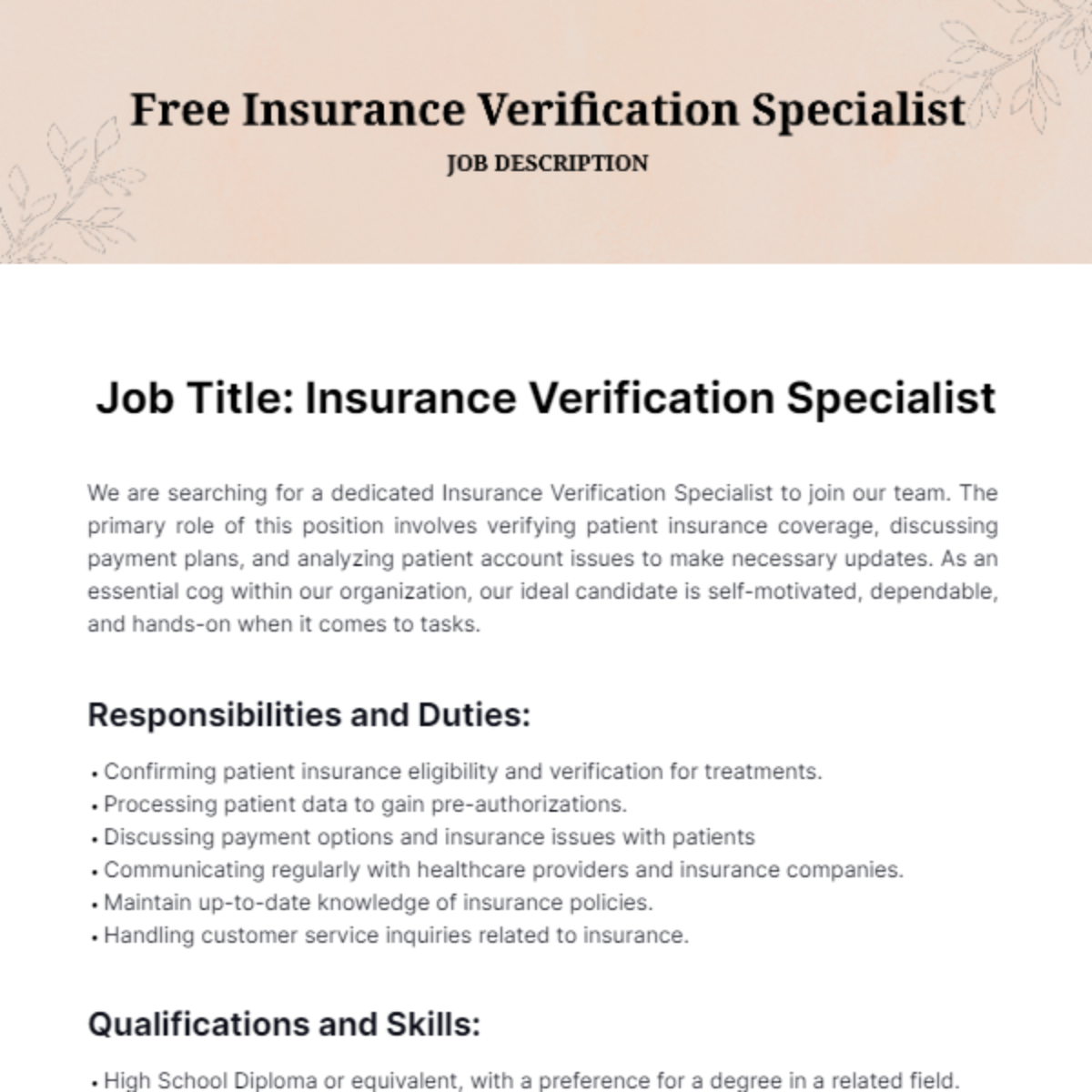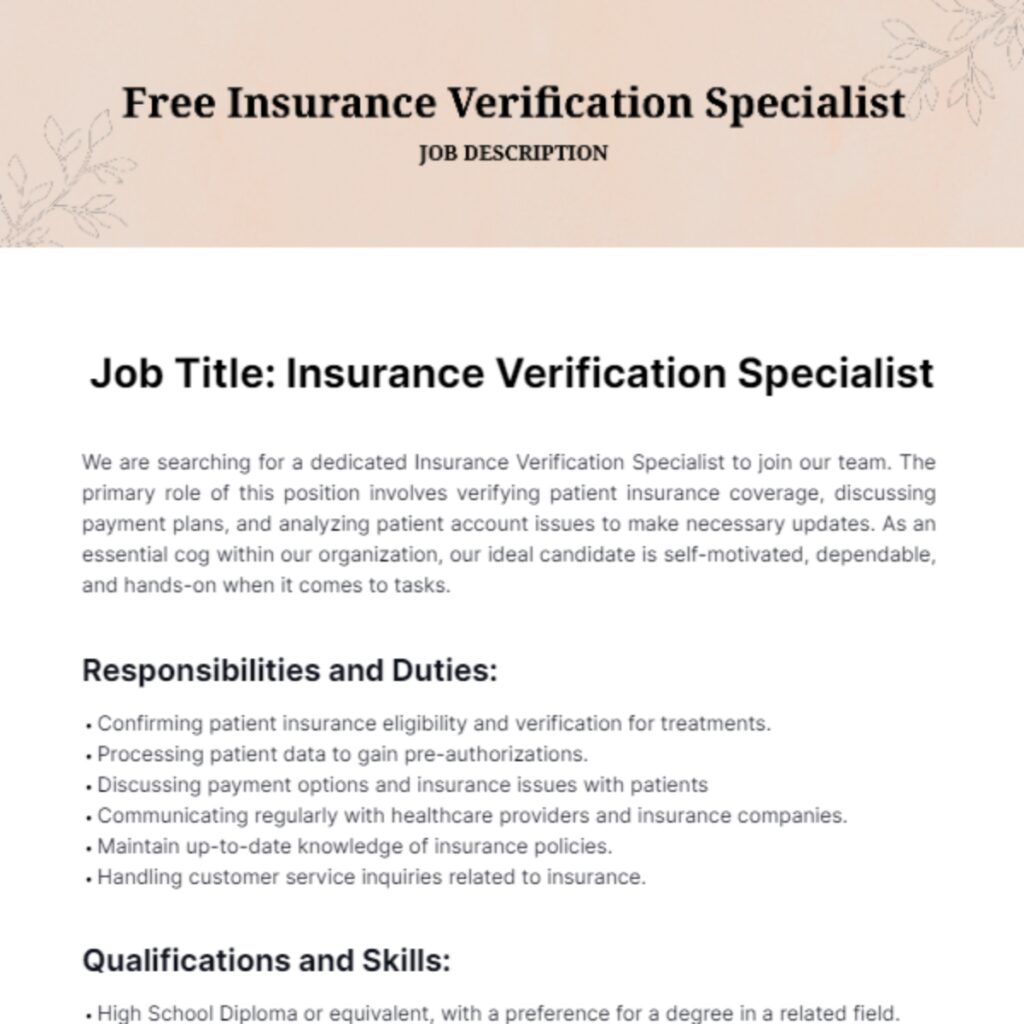Job Description Overview
Insurance verification specialists are responsible for verifying and processing insurance information for healthcare providers. They work with patients, insurance companies, and healthcare providers to ensure that insurance claims are processed accurately and efficiently.
The primary responsibilities of an insurance verification specialist include:
- Verifying patient insurance coverage
- Processing insurance claims
- Resolving insurance claim denials
- Maintaining patient insurance records
- Educating patients about their insurance coverage
Insurance verification specialists typically need to have a high school diploma or equivalent and some experience in the healthcare industry. They also need to be proficient in medical terminology and insurance billing procedures.
Required Skills and Qualifications
The following skills and qualifications are required for the position of insurance verification specialist:
- High school diploma or equivalent
- Some experience in the healthcare industry
- Proficiency in medical terminology
- Proficiency in insurance billing procedures
- Excellent communication and interpersonal skills
- Strong attention to detail
- Ability to work independently and as part of a team
Insurance Verification Process
Insurance verification is the process of determining if an individual or organization has insurance coverage and the extent of that coverage. This process involves several steps and methods to ensure accuracy and efficiency.
The insurance verification process typically begins with collecting information from the policyholder, such as their name, date of birth, and policy number. This information is then used to contact the insurance company and verify the coverage.
Methods of Insurance Verification
There are several methods used to verify insurance coverage, including:
- Phone Verification: Contacting the insurance company directly to confirm coverage details.
- Online Verification: Using the insurance company’s website or online portal to access policy information.
- Electronic Verification: Utilizing electronic data interchange (EDI) to exchange insurance information with healthcare providers.
- Manual Verification: Reviewing physical insurance cards or policy documents to verify coverage.
Importance of Accuracy and Efficiency in Insurance Verification
Accuracy and efficiency are crucial in insurance verification to ensure that patients receive appropriate and timely medical care. Inaccurate or incomplete insurance information can lead to delays in treatment, billing errors, and potential financial burdens for both patients and healthcare providers.
Insurance verification specialists play a vital role in ensuring the accuracy and efficiency of the verification process. They must have a thorough understanding of insurance policies, billing procedures, and healthcare regulations to provide reliable information to healthcare providers and patients.
Customer Interaction
Effective communication with patients and insurance companies is essential for the smooth and efficient processing of insurance verifications. Insurance Verification Specialists serve as a vital bridge between these parties, ensuring that accurate information is exchanged and insurance-related issues are resolved promptly.
To maintain a positive and professional demeanor while interacting with customers, it is crucial to:
Maintaining Professionalism
- Use clear and respectful language.
- Actively listen to customer concerns.
- Emphasize empathy and understanding.
- Remain calm and composed, even under pressure.
- Maintain a positive and upbeat tone.
Resolving Insurance-Related Issues
When resolving insurance-related issues, it is essential to:
- Thoroughly understand the patient’s insurance policy.
- Identify the root cause of the issue.
- Communicate clearly with the insurance company.
- Negotiate and advocate for the patient’s best interests.
- Document all interactions and resolutions.
Answering Customer Inquiries
When answering customer inquiries, it is important to:
- Provide accurate and timely information.
- Use clear and concise language.
- Anticipate potential questions and prepare responses.
- Refer complex inquiries to the appropriate department or supervisor.
- Follow up with customers to ensure their satisfaction.
Technology and Tools
Insurance verification specialists rely on a range of software and tools to streamline their work and enhance accuracy. These tools include:
- Insurance verification software: Specialized software that automates many tasks involved in insurance verification, such as data entry, policy retrieval, and claim processing.
- Electronic health records (EHRs): Systems that store patient health information digitally, allowing insurance verification specialists to access medical records quickly and easily.
- Billing and coding software: Software that helps insurance verification specialists accurately process medical bills and assign the correct codes.
Staying Up-to-Date
In the rapidly evolving healthcare industry, it is crucial for insurance verification specialists to stay up-to-date with the latest advancements in technology and industry best practices. By attending conferences, reading industry publications, and participating in continuing education programs, insurance verification specialists can ensure they are using the most efficient and effective tools and techniques.
Compliance and Regulations

Insurance verification is a highly regulated industry, with strict laws and regulations governing the process. Understanding and adhering to these regulations is crucial to ensure compliance and avoid potential legal consequences.
Relevant Laws and Regulations
* Health Insurance Portability and Accountability Act (HIPAA): Protects the privacy and security of patient health information, including insurance details.
* Patient Protection and Affordable Care Act (ACA): Requires health insurers to provide standardized coverage and simplifies the verification process.
* State-specific regulations: Varying laws may exist at the state level, governing the collection and use of insurance information.
Ethical Guidelines and Best Practices
Beyond legal compliance, it’s essential to follow ethical guidelines and best practices to maintain the integrity of the verification process. These include:
* Confidentiality: Maintaining the privacy of patient information is paramount.
* Accuracy: Ensuring the accuracy of insurance details to avoid incorrect or delayed treatment.
* Timeliness: Verifying insurance information promptly to facilitate timely access to care.
Common Compliance Issues and Avoidance
* Breach of patient privacy: Unlawful disclosure or misuse of protected health information.
* Incorrect verification: Errors in collecting or interpreting insurance details, leading to coverage denials.
* Delay in verification: Prolonged verification times due to inefficient processes or lack of resources.
To avoid these issues, implement robust security measures, train staff on compliance protocols, and streamline the verification process using technology and automation.
Career Advancement
Insurance verification specialists can advance their careers in several ways. With experience and additional training, they can move into supervisory or management roles. They can also specialize in a particular area of insurance, such as health insurance or property and casualty insurance. Additionally, they can obtain professional certifications, such as the Certified Insurance Verification Specialist (CIVES) designation, to enhance their credibility and career prospects.
Factors Contributing to Career Advancement
Several factors contribute to career advancement in the field of insurance verification, including:
- Experience: The more experience an insurance verification specialist has, the more likely they are to be promoted to a higher-level position.
- Education: Insurance verification specialists with a college degree or other higher education credentials are more likely to be promoted than those without.
- Certifications: Obtaining professional certifications, such as the CIVES designation, can demonstrate an insurance verification specialist’s commitment to the field and enhance their career prospects.
- Performance: Insurance verification specialists who consistently exceed expectations in their current roles are more likely to be considered for promotions.
- Networking: Building relationships with other professionals in the field can help insurance verification specialists learn about new opportunities and advance their careers.





